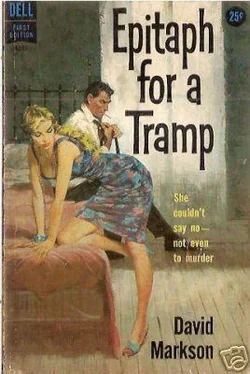It took a minute, and then the door did not open.
“Who is it?”
“Ned Sommers?”
“Who wit?”
“Sommers?”
It could go on that way until one of them got laryngitis before Brannigan would say “Police.” More than one accommodating flatfoot has gotten his wife’s name on the department’s relief list for needy widows by doing that. He just stood there waiting calmly. Finally we got a crack big enough to pass mail through.
“Ned Sommers?”
He peered out at us, furrowing his forehead. He was a sallow-faced man of about twenty-eight, lean almost to the point of being undernourished. I judged him to be close to six-feet-even but he would not have gone in as more than a welterweight. He had wavy black hair which he had gotten cut for his grade school graduation and not since, pale brown eyes and a nose which had been flattened once. It was a nose which might have made another man look belligerent. It only made Sommers look like someone who ought to have known better. He was wearing cord slacks and nothing else, and if he had been dressed there would have been a library card in his shirt pocket.
“I’m Sommers,” he said finally.
One of his hands was on the inside knob and his other was on the door jamb. Brannigan identified himself then, flashing his shield. “We’d like to ask you some questions.”
Sommers continued to frown at us. “Questions about what? I’m pretty busy.”
We were standing there. Sommers had glanced behind himself, pursing his lips. He turned back. “Let me get a shirt on. I’ll come out.”
“Step away from the door,” Brannigan told him.
“Oh, now look, a man has a right to privacy in his own—”
He moved aside. He had to, since Brannigan was already on his way in. The expression on his face suggested that he would have liked nothing better than to bop one of us with a choice volume of the Cambridge History of English Literature. I could see the fall set on the wall behind him, along with what looked like every other juicy bit of bedtime reading from The Nicomachean Ethics to The Coming Forth by Day of Osiris Jones. I couldn’t see the woman, but she would be behind the door someplace.
She wasn’t quite, but only because the bed wasn’t there. It was along the far wall to our left. She was sitting up in it with the sheets drawn around her shoulders. I supposed she might have ducked into another room if that hadn’t been the only room there was.
One room. It seemed hardly adequate for Sommers’s creative pursuits. The books went from floor to ceiling along two walls. There were enormous piles of what must have been every issue of the New York Times since Harper’s Ferry and Sommers appeared to be reading all of them simultaneously. There were copies of Time with pictures of Neville Chamberlain and John Nance Garner on the covers. There were a hundred different photographs tacked on the two empty walls, and every one of them was of Ernest Hemingway.
The girl’s clothes were scattered among the debris as if she’d been caught in a cyclone without enough safety pins.
She was staring at us, still as cut stone. An adder being held by the back of the jaws would have had the same expression in its eyes. She was a Negro and as beautiful a girl as I had ever seen.
Brannigan turned to Sommers, red-necked. “Out front,” he said. “And make it quick.” He turned around and went out without looking at me.
We waited at the foot of the steps below the sidewalk. Across the way a sign in an unwashed store window said: Sonny Tom Laundry Will Moving at Monday for Corner Fourth Street Down-flight. Brannigan had taken out a cigar and stripped it but did not light up.
Sommers got there in a minute. He had pulled on a yellow sports shirt and thonged leather sandals and he was smoking.
He glanced at me, dismissed me as a mere adjutant, then waited expressionlessly for Brannigan.
Brannigan was above him on the steps. “I suppose you were here all night?”
“Most if it, yes.”
“What time did you get in?”
“Three-thirty, perhaps four. Why?”
“Any other people with you before that?”
“Yes. Two or three young writers who come to me for advice and—”
“Where?”
“The White Horse Tavern, then a coffee shop down on Mac-dougal. Exactly what is all this, anyhow?”
“There any gap between the time you left the others and came here?”
“No, none at all. They walked me up, in fact. These other fellows haven’t been published yet, so it’s sort of an obligation to let them hang around as much as they—”
“Okay, okay, you’re a famous writer and the disciples cluster around like flies. We get the general drift, Sommers. The girl with you all evening long?”
Sommers’s face had darkened. He didn’t answer.
“I asked you if the girl was around all night.”
“Yes. Now look, I don’t think I have to answer any of this. If I don’t get an explanation I—”
“ Wherfs the last time you saw Catherine Hawes?”
He frowned slightly. “Cathy? A week or so ago. No, more than that. It was a Sunday, so it’s almost two weeks.”
“Tell us about her.”
“Now just what is that supposed to mean?” He glanced at me then back to Brannigan. “She isn’t in some kind of trouble—?”
“What kind of trouble would she be in, Sommers?”
“Well, how would I know? Look, what’s the point in giving me a hard time? Ask me a sensible question and I’ll give you a decent answer, huh? ”
Brannigan bit off the end of his cigar, turning to spit. “Tell us about her, Sommers. What she does, what she thinks.”
“Oh, come on, will you? If you’d let me know what ifs about maybe I could—”
“You’re the writer. So write. Give us a paragraph about Catherine Hawes.”
Sommers shrugged wearily. He studied his cigarette, dragged on it, flipped it out toward the gutter. He would have liked more of an audience but he gave it to us anyhow. “Catherine Hawes,” he said. “About twenty-five, exceptionally pretty. Bright too, but without much intellect. Neurotic, divorced, essentially uninhibited. Just enough sensitivity and awareness so that she can’t be satisfied with the ordinary middle-class existence — husband, family, that sort of thing — but not enough creativity or drive to find anything to take its place. She drifts, goes off the deep end sometimes, generally out of sheer boredom — drinks too much, looks for new kicks. There are a lot of girls like her. They shouldn’t go to college to start with. They get just enough ideas about art and rebellion to get restless. But most of them settle down eventually, wind up at cocktail parties in the country club and forget they ever knew the difference. They play golf. Cathy probably will too, sooner or later.”
“You said she was married.”
“She cheated. It broke up.”
“She a nympho?”
“I wouldn’t put it that way. She was knocking around a lot before the marriage. People get used to that. It’s not the sexual satisfaction so much as the excitement of somebody new. Hell, even I was the same way. I was married a couple of times myself, out of this same Village milieu. It was good enough while it lasted — I didn’t need other women, no — but the idea is always there. You get the urge, you follow through. Anyhow it’s an important experience for a writer. You’ve got to—”
“Edifying,” Brannigan cut in. “Who would she go to if she got into a jam? Who is she closest to?”
Sommers shrugged again. “Look, I don’t really know. The girl she lives with, perhaps. Sally Kline. Maybe she’d come to me. How about it now — what kind of trouble?”
Читать дальше












